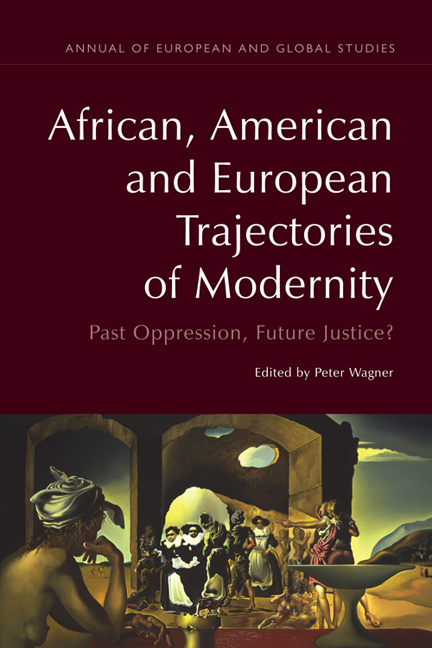Book contents
- Frontmatter
- Contents
- List of Figures
- Introduction
- Part I Reconstructing the History of Atlantic Modernity
- Part II Comparing Trajectories of Modernity in the South
- 6 Inconsistencies between Social-democratic Discourses and Neo-liberal Institutional Development in Chile and South Africa: a Comparative Analysis of the Post-authoritarian Periods
- 7 7. HIV/AIDS Policies and Modernity in Brazil and South Africa: a Comparative Critical Analysis
- 8 Land and Restitution in Comparative Perspective: Analysing the Evidence of Right to Land for Black Rural Communities in Brazil and South Africa
- Part III Claims for Justice in the History of Modernity and in its Present
- Notes on the Contributors
- Index
6 - Inconsistencies between Social-democratic Discourses and Neo-liberal Institutional Development in Chile and South Africa: a Comparative Analysis of the Post-authoritarian Periods
from Part II - Comparing Trajectories of Modernity in the South
Published online by Cambridge University Press: 05 August 2016
- Frontmatter
- Contents
- List of Figures
- Introduction
- Part I Reconstructing the History of Atlantic Modernity
- Part II Comparing Trajectories of Modernity in the South
- 6 Inconsistencies between Social-democratic Discourses and Neo-liberal Institutional Development in Chile and South Africa: a Comparative Analysis of the Post-authoritarian Periods
- 7 7. HIV/AIDS Policies and Modernity in Brazil and South Africa: a Comparative Critical Analysis
- 8 Land and Restitution in Comparative Perspective: Analysing the Evidence of Right to Land for Black Rural Communities in Brazil and South Africa
- Part III Claims for Justice in the History of Modernity and in its Present
- Notes on the Contributors
- Index
Summary
IN COUNTRIES SUCH as Chile in Latin America and South Africa on the African continent, drastic processes of democratisation occurred in the political sphere during the 1990s, accompanied by radical processes of economic liberalisation. These processes assumed a neoliberal character that generated a development pattern characterised by substantial market reforms and a reduction of state functions.
After their authoritarian periods, apartheid in South Africa and the military dictatorship in Chile, the economic trajectory of both societies can be considered successful in economic terms when judged by its results, namely, a decrease in poverty and an increase of the gross domestic product (GDP) (Ffrench-Davis, 2003). Despite the favourable economic indicators, however, these countries have maintained high levels of inequality, South Africa currently being the most unequal country in the world (Palma, 2011; Habib, 2013).
The adjustments and reforms, typical of the authoritarian periods, have generated serious social and economic crises in both societies. These crises, which have continued with the democratic transitions, have undermined the industrial base on one side and, on the other, led to greater capital concentration, determining the specialisation of resources and intensive working sectors (Palma, 2011; Habib, 2013).
The aim of this chapter is to develop an understanding of the manner in which economic policies in post-authoritarian societies are influenced by policies formulated during previous authoritarian periods, as well as the mechanisms that lead to the continuity of an economic policy framework that allows the perpetuation of social inequality. There is an emphasis on processes and discourses, such as communicative norms, that have constituted a particular kind of capitalist development in post-authoritarian peripheral societies and their asynchrony or inconsistency with political practice.
The discussion below proceeds as follows: first there is a brief introduction to both nations’ historical contexts; second, a socioeconomic analysis of Chile's post-authoritarian period is developed; third, an analysis of South Africa's post-authoritarian period, with both countries being discussed with a view to identifying mechanisms of continuity. In the fourth section, five such mechanisms of institutional continuity, which may serve as hypotheses to explain the neo-liberal trajectories, are highlighted. Finally, some conclusions are sketched.
- Type
- Chapter
- Information
- African, American and European Trajectories of ModernityPast Oppression, Future Justice?, pp. 125 - 148Publisher: Edinburgh University PressPrint publication year: 2015



